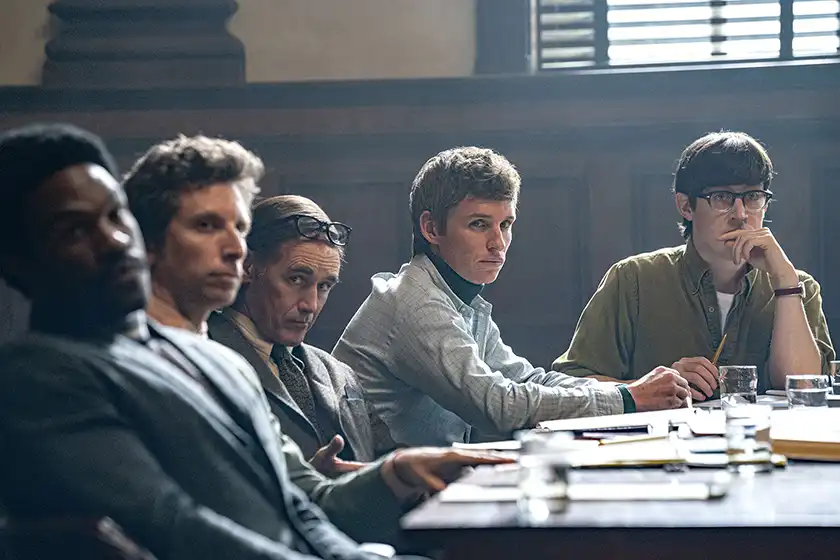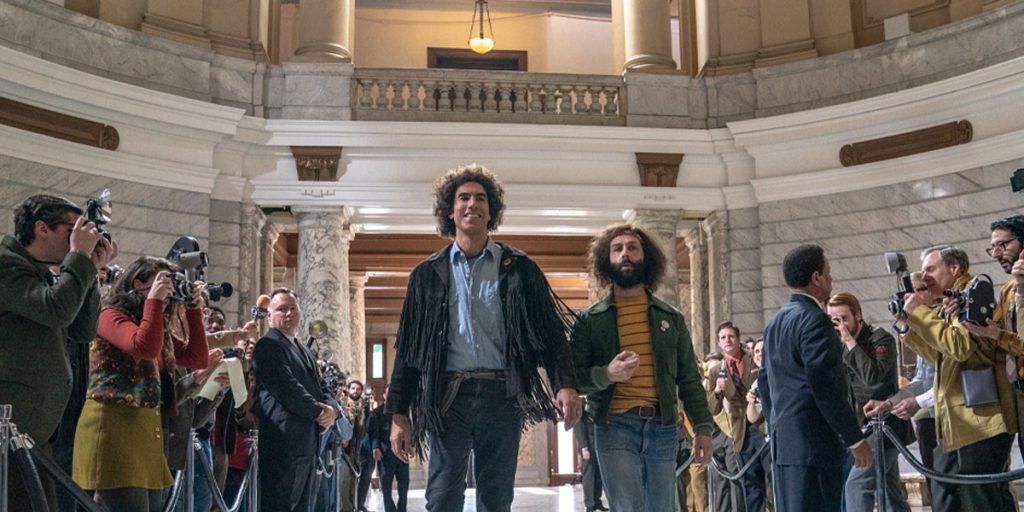When The Trial of the Chicago 7 finds its rhythm, it rewards you with some of the finest political cinema of recent years.
The Trial of the Chicago 7 is far from the first film released about the 1969 trial, in which five of seven (originally eight) defendants were found guilty of inciting riots at the 1968 Democratic National Convention. The case has found itself inexorably etched into American folklore, and, like all folklore, it stands for far more than its own immediate effects. It represents a turning point as, in the death throes of the free love of the 1960s in the face of a Nixon-led new era of politics, opposition to the Vietnam War seeped from the “radical” left into the political mainstream. The players, from wisecracking Yippies Abbie Hoffman and Jerry Rubin to partisan judge Julius Hoffman, have become woven into the fabric of the heroes and villains of the decade. The facts of the case have, in many ways, become secondary to its legend.
Writer/director Aaron Sorkin (The West Wing, The Social Network) is very clearly aware of all of this – The Trial of the Chicago 7 is not a documentary. It distorts and slices its own timeline, and is more than happy to imagine dramatized interactions between each defendant. However, it does so with a firm grip on not just its subject matter, but what that subject matter means. The steady, brutal stream of victims of the Vietnam war looms large over every scene in the defence headquarters. The occasional intercut with documentary footage reminds us of the real, tangible damage that the courtroom is distinctly and pointedly uninterested in – the beatings of men and women on the streets of Chicago, the murder of Black Panthers in their own homes.

In this ensemble cast, Sorkin finds a toolkit that fits beautifully with the purest distillation of a style he has become known for over the past several decades: the film is rife with one-line retorts, withering putdowns and walk-with-me exposition. The defendants themselves make up a fascinating microcosm of the famously fractured New Left, from strait-laced, pragmatic Tom Hayden (Eddie Redmayne) to the raw and jocular idealism of Rubin and Hoffman (respectively, Jeremy Strong and an excellent Sasha Baron Cohen) with Mark Rylance as defence lawyer William Kunstler keeping a steady hand on proceedings.
The villains are well-represented, too, with Frank Langella’s Judge Hoffman and Joseph Gordon-Levitt’s Charles Schultz, head prosecutor, marking the key representatives of the all-powerful Nixon government. Much applause will be showered upon Redmayne and Baron Cohen for their performances, and rightfully so; however, it is Yahya Abdul-Mahteen II as Black Panther Bobby Seale that provides the film’s beating heart, with each of his lines resonating with a quiet, dignified fury that keeps Sorkin’s screenplay from drifting into the realms of pure political fantasy.
Sorkin attempts to balance so many thematic spinning plates at once in the film that occasionally a note turns sour, a sequence feels misjudged, and we’re reminded of the film’s separation from its own reality. However, every now and then, each of the moving parts of the picture click into unified synchronicity, and the weight of the story Sorkin tells hits like a freight train, with a fitful energy that inspires and angers with equal measure. The Trial of the Chicago 7 is a story dripping in mythos, yet teeming with incredible humanity, with a power that more than carries across the five decades between then and now: folklore inseparable from the world today.

